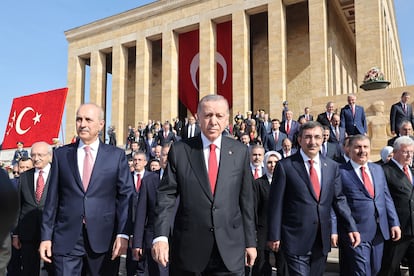Erdogan aims to emulate Atatürk as Turkey celebrates its centenary
The president has canceled several celebratory events due to the situation in Gaza, generating criticism from secular sectors


One of the first things Turkish children learn at school is to identify images of Mustafa Kemal Atatürk: be it in military uniform or frock coat; wearing a traditional kalpak cap or a top hat; with moustache, beard, or clean-shaven; smoking pensively on the hills of Gallipoli or looking optimistically into the future from the rostrum of parliament. There is no doubt that, personality cult aside, the man who proclaimed the Republic in Turkey a century ago now, on October 29, 1923, has an important place in the hearts of the vast majority of Turkish citizens for his leadership in the War of Independence and his work as a modernizer.
“A dictator. But a dictator who has employed authority and prestige in pulling his homeland out of the abysses into which incuriosity and superstition were plunging it [...]. He put an end to the Caliphate, proclaimed the Republic, transformed all customs. He turned a medieval country into a great European nation”, wrote the Barcelona newspaper El Diluvio a few days after his death in 1938.
Although most current historians inscribe Turkey’s first president in an undercurrent of reformism and modernization initiated in the Ottoman Empire during the 19th century, there is no doubt that the “Atatürk revolutions” — as they were called before the conservative military coup of 1980 reduced them to the more moderate “reforms” — transformed Turkey and turned it into a model for many countries in the region: women were granted rights (including the right to vote and to be elected, in 1930), the Arabic alphabet was changed to Latin, the monarchy and the caliphate were abolished, a process of industrialization began, secular education was introduced, and religious brotherhoods were banned.
All this for decades made Atatürk anathema to the Islamist movement from which the current president, Recep Tayyip Erdogan, and his conservative-democratic Justice and Development Party (AKP) originate. “Those who come from the Islamist tradition don’t think very highly of the Republic. But the Republic is already a fait accompli, so they cannot oppose it, even if they are not very enthusiastic about celebrating it,” explains Selim Koru, an analyst at the TEPAV think tank.
While schools, artists, and social organizations have held numerous activities to commemorate the centenary, secular media and intellectuals have criticized the lack of events organized by the government. Erdogan canceled a palace reception citing the Israeli attack on Gaza, and for the evening of the eve of Republic Day organized a massive rally in support of Palestine with the participation of numerous Islamist organizations.
The song Sen rahat uyu (Sleep peacefully) created by Turkish pop star Tarkan in honor of Atatürk on the centenary of the proclamation of the Republic.
“This is not how you celebrate an anniversary. No Republic has ever commemorated its centenary in this way. Our people are not aware of the progress the Republic brought us,” popular historian Ilber Ortayli said on social media. In fact, the official website on the centenary “can be considered propaganda of the AKP government,” according to analyst Murat Yetkin, as it focuses more on the achievements of Erdogan in his two decades at the helm of the country.
A turbulent history
Mustafa Kemal — who would later be awarded the surname “Atatürk” or “father of the Turks” — organized and led the resistance of Turkish nationalist forces against the powers (Great Britain, France, Italy, and Greece) that had occupied the remnants of the Ottoman Empire at the end of World War I. After proclaiming the Republic, he focused on rebuilding a country devastated by a decade of conflict and imposing his program “to raise Turkey to the standards of contemporary civilization.” His party, the CHP (today the main opposition party), ruled for 27 years with an iron fist, repressing all rebellions — Islamist and Kurdish — that tried to prevent the reforms.
The following 53 years were characterized by a somewhat chaotic democratic alternation in which there were 40 governments, mostly from the right, and four coups d’état. The last 20 years have been dominated by Erdogan, first as prime minister and then as president. Hence, one of the government slogans of the centennial is “From Independence to Stability” stamped over similar photographs of Atatürk and Erdogan.
If one pays attention to the rhetoric of recent years, one can perceive a substantial change. “Erdogan seems not to be impugning Atatürk, but emulating him to present himself as the savior-founder of the New Turkey,” writes political scientist Hakki Tas in A Companion to Modern Turkey’s Centennial, a recent volume co-authored by several scholars. “In many ways, Erdogan has followed the Kemalist model of state- and nation-building. Both were shaped by an erosion of liberal values as well as the rise of authoritarian ideologies in their eras, following the Great Depression (1929-1939) and the Great Recession (2007-2009), respectively. As was the case during Turkey’s formative years, Erdogan’s program culminated in the unification of state and party, thanks to the cult of personality.”
“Erdogan is the most powerful and influential leader since Atatürk and has established his own regime despite doing so within the institutions and structure of the Kemalist Republic,” Koru argues, “Erdogan would like to have the loyalty and participation of the whole country, but he has to be content with the support of only half, so he uses these comparisons [with Atatürk] to gain legitimacy in the eyes of the other half.”
Installations and exhibits placed in various locations in Istanbul for the centenary present the achievements of the past few years under Erdogan’s rule — primarily in technology and infrastructure — as Atatürk’s great aspirations. But rather than looking to the past to commemorate it, the narrative promoted by the government looks to the future opening up after the first 100 years of the Republic, accompanied by the hallmark of the “Century of Turkey” project, which aims to place the country among the most developed in the world. One of these exhibitions is entirely dedicated to Erdogan, and presents him as the ideologue and author of the most recent advances in the Turkish military industry. “We are committed to raising Turkey in all fields to the levels of the most advanced countries,” writes the Turkish president in the presentation, imitating Atatürk’s maxim: “Our goal is a Turkey that, by land, sea and air, and God willing, also in space, instills confidence in our friends and fear in our enemies.”
Sign up for our weekly newsletter to get more English-language news coverage from EL PAÍS USA Edition
Tu suscripción se está usando en otro dispositivo
¿Quieres añadir otro usuario a tu suscripción?
Si continúas leyendo en este dispositivo, no se podrá leer en el otro.
FlechaTu suscripción se está usando en otro dispositivo y solo puedes acceder a EL PAÍS desde un dispositivo a la vez.
Si quieres compartir tu cuenta, cambia tu suscripción a la modalidad Premium, así podrás añadir otro usuario. Cada uno accederá con su propia cuenta de email, lo que os permitirá personalizar vuestra experiencia en EL PAÍS.
¿Tienes una suscripción de empresa? Accede aquí para contratar más cuentas.
En el caso de no saber quién está usando tu cuenta, te recomendamos cambiar tu contraseña aquí.
Si decides continuar compartiendo tu cuenta, este mensaje se mostrará en tu dispositivo y en el de la otra persona que está usando tu cuenta de forma indefinida, afectando a tu experiencia de lectura. Puedes consultar aquí los términos y condiciones de la suscripción digital.








































